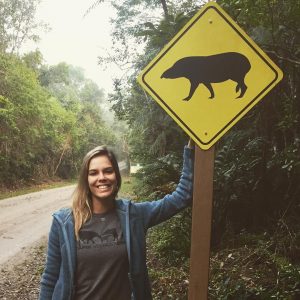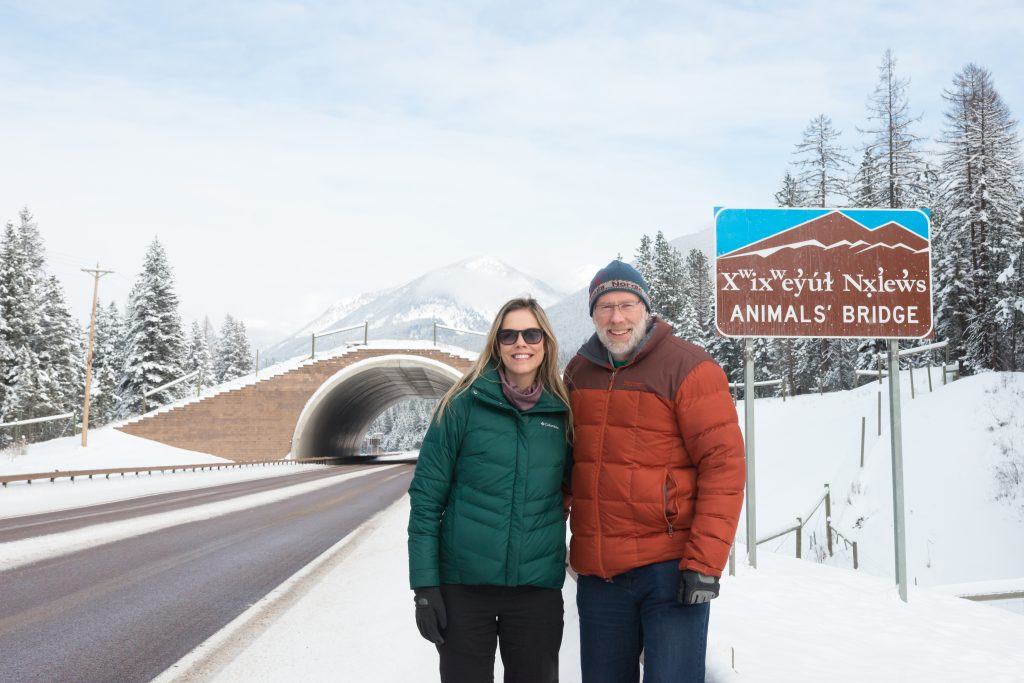
Fernanda Abra, a Brazilian Ph.D. student who has conducted wildlife research with a leading WTI road ecologist for nearly a decade, is one of only three scientists worldwide to be selected for the 2019 Future For Nature Award, announced on February 19.
A few months ago, eight young conservationists from around the world were nominated for the Future For Nature Award. The nominees came from Brazil, India, Nepal, The Netherlands, Nigeria, the Philippines, Rwanda, and the United Kingdom. Today, the three award winners were announced: Fernanda Abra (Brazil), Divya Karnad (India), and Olivier Nsengimana (Rwanda). Fernanda Abra has a long-term connection with Montana and is currently working in Missoula with one of her PhD advisors, Dr. Marcel Huijser.
The Future For Nature Foundation (FFN) is a Dutch organization that supports young, talented and ambitious conservationists, committed to protecting wild animals and wild plant species. FFN states that “The commitment of these individuals is what will make the difference for the future of nature. Through their leadership they inspire and mobilize communities, organizations, governments, investors and the public at large.”
Every year, three awards are available to young conservationists from all over the world. The Award offers the winners international recognition, financial support of 50,000 Euros to carry out their work, and the opportunity to work with an international network of conservationists.
Ms. Abra is a PhD student in the Applied Ecology program at “Luiz de Queiroz” College of Agriculture, University of São Paulo (ESALQ/USP). Her advisors are Dr. Kátia Ferraz (professor at ESALQ/USP, Department of Forest Science, LEMaC Wildlife Ecology, Management and Conservation Lab) and Dr. Marcel Huijser (research ecologist at the Western Transportation Institute, Montana State University).
“As a researcher, Fernanda has already made a positive impact on species conservation in Brazil. For her PhD she is generating knowledge on the number of road-killed mammals, understanding their spatial and temporal patterns, and developing tools to reduce the huge impact of roads and traffic on Brazil’s biodiversity. The combination of hard work and determination will result in reduced unnatural mortality of mammals and reduced habitat fragmentation caused by transportation infrastructure,” Said Dr. Katia Ferraz.

Interested in Road Ecology since 2009, Ms. Abra is now in the final stages of her PhD research. Her work focuses on animal-vehicle collisions along highways in São Paulo State and implications for biological conservation, human safety, and the economy. Dr. Marcel Huijser of the Western Transportation Institute at Montana State University has worked with Ms. Abra for nearly nine years, overseeing her 2010 internship on the wildlife mitigation study along US Hwy 93 on the Flathead Indian Reservation, as well as advising on both her Masters research and her PhD in Brazil. Through her work with Dr. Huijser she has been fortunate to be able to study and apply some of the lessons learned from Montana’s investment in wildlife crossing structures along highways and animal detection systems in the region.
As Dr. Huijser explains:“Fernanda has long term vision, concrete goals, and the political savvy to get things done. When I first met her in 2010, she realized that local expertise in road ecology was needed to manage the environmental impacts associated with Brazil’s quickly expanding transportation network. And she made this happen by securing funding for me to teach two graduate level road ecology courses and for two national conferences on transportation ecology. Thanks to her vision, hundreds of Brazilian students, researchers, and policy makers have been introduced to road ecology concepts. As a result, an increasing number of wildlife mitigation measures are being effectively implemented on the ground in Brazil.”
In addition to her academic research and work as a consultant, Ms. Abra volunteers as a road ecologist for several conservation projects including the Lowland Tapir Conservation Initiative and the Anteaters and Highways Project. She is also responsible for the road-ecology data in the National Action Plans for threatened canids, felids and ungulates, including iconic species such as the maned wolf, hoary fox, jaguar, puma, and lowland tapir.
Dr. Patricia Medici, coordinator of Lowland Tapir Conservation Initiative in Brazil, Chair of Tapir Specialist Group of IUCN and Winner of the FFN Award in 2008 has worked with Ms. Abra for several years. She explains that: “Fernanda plays a key role in the conservation of Brazilian mammal species because she knows how to measure the extent of the road-kill impact, the barrier effect of transportation infrastructure, and, most importantly, she knows how to mitigate the problems. I find it very interesting how Fernanda feels confident and comfortable both doing fieldwork under tough conditions along highways and participating in technical and political meetings with professionals and authorities from environmental and transportation agencies. She is extremely versatile and knows how to keep that link between the world out there and the meeting rooms.”
FFN winners are truly inspiring young individuals, who are bringing creative and innovative solutions to pressing environmental problems. Ms. Abra’s win shines a light on the global impact of roads on wildlife and the leadership role that both Montana and Brazil are taking to mitigate these impacts for the benefit of people and wildlife.
In response to winning the award, Ms. Abra said: “I feel so fortunate to work with incredible species such as tapirs, giant anteaters, maned wolf, jaguar, and other Brazilian canids and felids, and to be advised and supported by respected researchers and conservationists! I´m honored to receive the Future For Nature Award – this will help upscale my efforts to work with stakeholders, implement on-the-ground projects, and help protect Brazil’s amazing biodiversity.”
More information about Future for Nature: https://futurefornature.org/
More information about ESALQ/USP, Department of Forest Science, LEMaC Wildlife Ecology, Management and Conservation Lab: https://www.esalqlemac.com/
